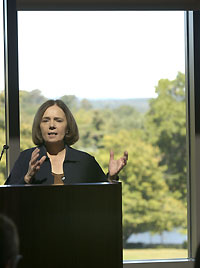|
This is an archived article.
For the latest news, go to the Advance Homepage
For more archives, go to the Advance Archive/Search Page. |
||
|
National Opinion Page Editors Convene At UConn Opinion pages could be more interesting if newspapers published more pieces by academics. That was the view of some of the opinion page editors attending a panel discussion Oct. 3, during the annual three-day conference of the Association of Opinion Page Editors, held this year at UConn. Chris Reed, columns editor for the opinion page of the Orange County Register (Calif.), was blunt in his assessment of the opinion pages of today's newspapers.
"Frankly," he said, "today's stable of (syndicated) writers, even the new, 'hot' writers, say the same thing. If you read the first paragraph of their columns, you don't have to go any further. You know what they're going to say. There are no surprises. Where are the contrarians?" The answer, according to several editors, includes reaching out to academia, where ideas - and opinions - are abundant. The conference included talks by former Secretary of State Henry Kissinger; Paul Gigot, editorial page editor of The Wall Street Journal; Gail Collins, editorial page editor of The New York Times; and David Ignatius, a syndicated columnist and former associate editor of the Washington Post. Participants also heard presentations by Kenneth Dautrich, director of the UConn Center for Survey Research; David Yalof, associate professor of political science; Regina Barreca, professor of English; Nell Newton, dean of the law school; and Robert Thorson, a professor of geology. They also toured the puppet arts facilities. The conference drew editorial and opinion page editors from such notable newspapers as The Arizona Republic, The Boston Globe, Houston Chronicle, The Seattle Times, Calgary Herald (Canada), The Christian Science Monitor, and The Philadelphia Inquirer. Jointly sponsored by UConn and The Hartford Courant, the event was organized by Carolyn Lumsden, opinion page editor for the Courant, and Karen Grava, manager of media communications in University Communications. "It was a wonderful way to showcase the state's investment in our University and, more importantly, some of our outstanding faculty to a very influential group of people," Grava said. Addressing the conference participants over lunch, Collins, of The New York Times, commented that more men than women voice their political opinions on the op-ed pages of the Times. She said she suspected that "more men than women are comfortable writing about political opinions." Collins, who recently published a book, America's Women: Four Hundred Years of Dolls, Drudges, Helpmates, and Heroines, said that historically, women were not supposed to be involved in politics. There were "rules on what women were supposed to be like. Women were to stay at home, and men had total control of the public sphere and church." During the 19th century, most of the reading public was female, Collins said, noting that they were "huge consumers of popular literature." Women also made money writing, and were editors of magazines. But, Collins noted, even if women talked about politics, they reframed what they said so it wouldn't seem as if they were involved in the political process. Collins became editorial page editor of The New York Times in June 2001. She said she never imagined being editorial page editor of anything, let alone The New York Times. "I was perfectly happy being a columnist," she said, "but it was hard to turn down." Founder of the Connecticut State News Bureau, which operated until it was sold in 1977, she has been the host of a public affairs program for Connecticut Public Television and a senior editor of Connecticut magazine. She was also a columnist at The New York Daily News and at New York Newsday. |

